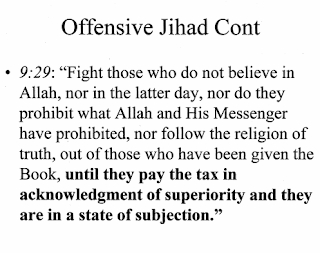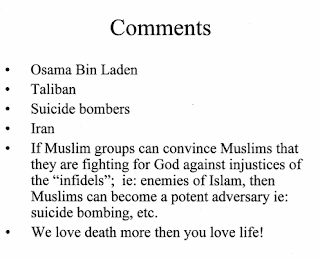28 Dec Major Nidal M. Hasan’s Jihad Seminar Explained
Major Nidal M. Hasan’s Jihad Seminar Explained
by Mark Durie
These are explanatory notes on Major Hasan’s seminar on ‘The Koranic World View As It Relates to Muslims in the U.S. Military.’ An earlier post surveyed some features of the seminar. These notes, put together while Pentagon and Senate investigations into the Fort Hoot shootings are still underway, go through the Major Hasan’s slides more systematically.
This seminar was presented to senior US Army medical personnel in June 2007, at the Walter Reed Army Medical Center. It gives a clear theological explanation for attacks by Muslim US military personnel on fellow American soldiers, and other related ‘adverse events’.
This first slide defines the subject matter of the presentation. It is about what Major Hasan defines as ‘The Koranic World View’. What he is about to present is grounded in the teachings of the Koran. Major Hasan will also rely upon the hadiths: an important resource for interpreting the Koran.
SLIDE 2.
Here Major Hasan lays out the objectives of his presentation. He intends to offer criteria to help in identifying which Muslim soldiers could have a religious conscientious objection to America’s military actions, and explain why there are potential negative implications of this for the military. He uses the phrase ‘religious conflicts’ to refer to the conflicted situation which Muslim military personnel may experience because of their divided loyalties.
Next Major Hasan defines jihad. He offers two Islamic understandings: personal struggle for self-perfection, and ‘holy war’ or ‘spiritual’ struggle against non-Muslims (‘infidels’). A third meaning is from contemporary English. Hasan refers to struggle with oneself as the ‘Greater Jihad’ and struggle against infidels (‘outside forces’) as ‘the lesser Jihad’. This is a reference to a hadith (tradition of Muhammad) which is not regarded as reliable by Muslim scholars. Another, more reliable tradition states that when opposing evil, action with the ‘hand’ (i.e. the use of force) must take precedence over internal or verbal opposition.
Emphasising the greater/lesser jihad distinction is a standard rhetorical strategy when presenting jihad to westerners. It has the effect of masking or softening the key religious concept of jihad as military action against non-Muslims. By ‘outside forces’, what Hasan means is non-Muslims: this is a euphemism, also intended to soften the impact of his key point. Indeed, for the presentation which follows, the most important point of this slide is the definition of jihad as ‘a Muslim holy war … against infidels’.
SLIDE 7 – The place of Islam among world religions.
In this slide, Major Hasan points out that there are thousands of Muslims in the US Armed Forces. The subject he is addressing is a significant one. Muslim leaders have claimed that there is a higher number of Muslims in the Military than official Pentagon statistics indicate.
SLIDE 10.
In this key slide, Major Hasan explains the significance of fatwas for the involvement of Muslims in the US military. He points out that fatwas can reflect conflicting opinions, and there is no single central authority to resolve these conflicts. Individual Muslims must make up their own minds which opinion to follow. He also observes that in relation to the issue of the position of Muslims in the US military, US-based clerics give ambiguous and vague rulings. This may be regarded as a sign that they are under duress. The implication is that their rulings carry less weight. However non-American scholars have issued clear statements rejecting the involvement of Muslims in the US military, on the grounds that this would mean engagement against ‘fellow Muslims’.
SLIDE 12.
Major Hasan explains the key issue for Muslims in the military: for a Muslim to kill another Muslim invites Allah’s wrath, curse and hell fire (Koran 4:93).
There is an exception: when there is a ‘just cause’ (Koran 17:33). However the implication is that a religious ruling would be required, which defines, in Islamic terms, why there is a just cause to be killing the enemy in each particular case. In essence Major Hasan is saying that when the US deploys its Muslim soldiers to Iraq and Afghanistan, it is sending them to hell, unless they have a fatwa which justifies the attacks on Muslims in the name of a ‘just cause’.
Here Major Hasan mentions four Muslims in the US military who have been convicted or suspected of disloyalty. Three are converts to Islam. Hasan Akbar (Mark Fidel Kools) followed his mother into Islam as a child, and killed fellow US soliders during the 2003 invasion of Iraq; James (Yusuf) Yee, who graduated from West Point in 1990 and converted from Lutheran Christianity to Islam in 1991, was accused of espionage during his work as a chaplain among internees at Guantanamo Bay; Waseef Ali Hassoun was convicted of desertion in Iraq; and Abdullah William Webster, who converted in 1994 after serving in Desert Storm, was court-martialled for refusing to serve in Iraq in 2004.
In this slide and the next, Major Hasan offers some suggestions for identifying which Muslims might be at risk of suffering from conflicted loyalities. He notes the contribution of a religious upbringing (not necessarily Islamic), citing the example of professional basketball player Kareem Abdu-Jabbar (formerly Ferdinand Lewis Alcindor, Jr). Another factor to be noted is the degree of religious devotion which is evidenced, e.g. reading the Koran, or devotion to daily prayers. Another factor is the degree of support received from fellow soldiers.
SLIDE 15. More Evaluation Criteria
Another factor is family perceptions.
Major Hasan points out that it would be a mistake to doubt these soldier’s loyalty to the US. Their problem is a divided loyalty – to God and Country – not lack of loyalty to country per se. Thus a Muslim soldier might be completely loyal when fighting against non-Muslim enemies, but conflicted if asked to fight against fellow Muslims.
Also Muslim soliders have a difficult time balancing their conflicting loyalties: they may experience feelings of guilt, and disappointment that this was not what they expected when they enrolled in the military. Major Hasan also points out the value of a mentor or chaplain in helping to work through this conflict.

Major Hasan now shifts gear, and begins to take his audience through an introduction to Islam. He does this to explain the precise nature – and origin – of the conflicted loyalty of Muslim solidiers. He regards it as important to understand which specific teachings of Islam can make Muslims’ participation in the military problematic.
Major Hasan introduces the Koran: his key idea is that interpreting the Koran requires setting it in the context of Muhammad’s life. This is because it was progressively ‘revealed’ throughout Muhammad’s life, and verses relate to specific events in his life. Major Hasan offers four key concepts for establishing the link between the Koran and its context in Muhammad’s life:
– hadiths. These are traditions of things which Muhammad and his followers did or said.
– sira. These are biographies of Muhammad’s life.
– asbab nasul ‘occasion of revelation’. This refers to the specific context in which a particular verse of the Koran was revealed, as may be determined by reference to the hadiths and sira.
– abrogation (naskh). This is the doctrine that verses revealed later in Muhammad’s life can override earlier verses. This principle is important when reading the Koran in the light of Muhammad’s life.
SLIDE 17. The Rule of Abrogation
Major Hasan cites authorities from the Koran which justify the rule of abrogation: that when verses of the Koran are in apparent conflict, the verses revealed later in Muhammad’s life overrule the earlier ones. This is important for understanding the Koran’s teaching on the use of force, which is a key issue in the presentation.
At this point Major Hasan outlines specific key elements in Islamic faith and practice. At the same time he emphasizes the obligatory character of Islam’s claims, and the dire consquences of rejecting them.
This slide references the ‘miracle’ of the Koran, namely that Allah has preserved it (15:9), and no-one could produce anything like it (2:23). This is standard Islamic apologetics to non-Muslims. However it is significant that (2:24) explains that anyone who does not follow the Koran can expect to become fuel for hell (2.24) The point is that the claims of the Koran cannot be regarded with indifference. Those who have embraced Islam are required to submit to the Koran’s teachings.
SLIDE 19. The Five Pillars
This is a classical outline of the five core practices of Islam.
Again, a classical outline of the six core beliefs of Islam.
SLIDE 21. The Purpose of Life
Maror Hasan reports the standard Islamic view that Abraham was a model Muslim.
Major Hasan uses the example of Abraham’s readiness to sacrifice his son Ishmael (as the Islamic tradition goes) as a model of what complete submission to Allah looks like. Allah will honor those who submit to him completely (37:110).
SLIDE 25. Dire Implications of Non-Submission: to be less than human
Major Hasan outlines the severe warnings in the Koran to those who do not submit to Allah’s guidance: God will hate them (‘as apes’); he makes references to Allah’s hatred and cursing of Jews (5:60, 7:166).
Major Hasan continues to emphasize Allah’s role as judge and punisher of human beings. Allah is able to be merciful (39:53), but he is the one who will decide the fate of each human being (29:21). A possible implication is that Muslims should prize their accountability to Allah above all other loyalties.
SLIDE 27.
These verses emphasize the fear of Allah. This should be at the centre of a Muslim’s sense of morality and ethics. Each ethical decision should be made in the light of eternal judgement and the torments of hell upon those who disobey Allah (39:14).
Major Hasan continues to explain, in this series of four slides, the high degree of motivation experienced by some Muslims to place their loyalty to God above their country, by emphasizing the benefits of submission: a beautiful eternity in Allah’s paradise. When Muslims are asked to fight against fellow Muslims, they place this eternal reward at risk.
SLIDE 30.
SLIDE 31.

SLIDE 35. An Application of the Rule of Abrogation
There are verses in the Koran which command Muslims to pursue peace, and verses which command fighting.
Major Hasan explains why some Muslims believe themselves to be under the command of the fighting verses, not the peaceful verses. For this he relies on the rule of abrogation. In essence his argument is that the peaceful verses applied in Mecca, when Muslims were not allowed to fight. Later, at Medina, self-defense was allowed, and then later fighting became obligatory. He summarizes: ‘Later verses abrogated former ie: peaceful verses no longer apply.’ The obligation to fight is a core component of the Islamic world view, and particularly its understanding of history: Major Hasan notes that it delivered much of the world to Islamic rule: ‘at one one point Islamic empire spanned form (sic) Morocco/Spain to the Border of India/China’.
It is a key point that Major Hasan is here relying on a mainstream tradition of interpreting the Koran. There are other interpretations, but in any case the point to grasp is NOT that this is the ‘correct’ or only interpretation, but to respect the fact that there are Muslims who accept this teaching and will feel compelled to live by it, for the reasons given by Major Hasan in earlier slides. Moreover it is not an aberrant or unusual interpretation. Major Hasan is explaining why the peaceful verses of the Koran may be of no use at all in moderating the obligation which some US Muslim military personnel could feel to fight against their fellow soldiers. Such Muslims may be fully aware of the peaceful verses, but will reject them on the basis of their understanding of principles which govern the contextual interpretation of the Koran, and specifically the rule of abrogation.
Major Hasan lists some of the well-known peaceful verses.
SLIDE 37. Defensive Verses
Major Hasan cites verses from the period when the Muslims were commanded to fight in self-defense.
Here Major Hasan emphasizes that to fight for Allah means rejecting ‘clinging’ to this life. One must love the life of the hereafter more than this life on earth. A Muslim should live for paradise, not for the comforts and enjoyments of this world. This is part of the Koranic world view.
SLIDE 39. More on Defensive Jihad
Fighting is not merely an option: it is an obligation, and those who refuse to fight will experience a painful punishment.
SLIDE 40. More on Defensive Fighting
Muslims, Major Hasan explains, are allowed to deal justly and kindly with non-Muslims who do not fight against them. The implication is that Muslims are not to act kindly and justly towards those who oppress fellow Muslims, driving them out of their homes. The practical implication of this verse is that if a Muslim believes the US forces are oppressing Muslims in Iraq and Afghanistan, the permission to treat fellow Americans justly and kindly does not apply. Muslims in the US military are under no obligation to deal decently with fellow US soldiers if the US military is oppressing Muslims, e.g. by making them flee their homes.
SLIDE 41. More on Defensive Jihad
Here Major Hasan indicates that there are limits to acceptable warfare, and if the non-Muslims cease attacking and oppressing Muslims, it is implied that warfare against them could cease, because Allah is merciful (2:192).
Major Hasan continues to apply the rule of abrogation in the Koran, taking his audience to the famous ‘verse of the sword’. The ‘Mushrikin’ (‘associaters’, i.e. non-Muslims) must be fought against. However if they convert to Islam (the verse refers to them adopting two pillars of Islam – see Slide 19) they are to be set free to go their way in peace.
The great commentator Ibn Kathir wrote of the Verse of the Sword that ‘These Ayat (verses) allowed fighting people unless, and until, they embrace Islam and implement its rulings and obligations’. And ‘This honorable Ayah (9:5) was called the Ayah of the Sword, about which Ad-Dahhak bin Muzahim said, “It abrogated every agreement of peace between the Prophet and any idolater, every treaty and every term.” (See here for the full passage from Ibn Kathir’s commentary.)
SLIDE 43. A Hadith to back up the Verse of the Sword
Major Hasan has earlier explained that the Koran must be interpreted in the light of the life of Muhammad, including the hadiths. Here he cites a famous hadith in which Muhammad defines his mission as fighting against people until they embrace Islam.
Major Hasan now takes the audience to consider an exception to the Verse of the Sword.
Those who have ‘been given the Book’ (Christians and Jews) are to be given a third choice as an alternative to Islam or the sword (cf Slide 42 and 9:5). They can be allowed to surrender, pay ‘the tax’, and keep their faith instead. However this concession is only temporary, as Major Hasan explains in his next slide.
SLIDE 45. Aggressive Future Jihad and the Muslim Jesus (Isa)
Major Hasan quotes a hadith that in the future, when the (Muslim) Jesus (the ‘son of Maryam’) comes back again, he will abolish the concession to surrender, symbolized by the jizya, which is ‘the tax’ referred to in the previous slide. From that point on, there will only be two choices: Islam or the sword.
Some Muslim scholars reject the claim that Islam was spread by the sword, on the grounds that the ‘third choice’ was offered to conquered peoples. Here Major Hasan also cites the famous verse which states that there is no compulsion in religion. The main interpretation of this verse, in the light of 9:29 discussed above, is that it is not right to compel Jews and Christians (and others) who have taken the ‘third choice’ to convert to Islam.
Major Hasan explains that according to the Koran, although Jews, Christians and others who believe in God are said to have a reward from God (2:62), a later verse abrogates this, stating that only Islam will be accepted (3.85).
SLIDE 48. Some Comments
Major Hasan offers some reflections on Osama Bin Laden, the Taliban, Suicide Bomber and Iran. He points out that, based on the interpretation of the Koran he has outlined, if Muslims can be persuaded that they are fighting ‘for God against injustices of the “infidels”‘ then they will be a ‘potent adversary’. This potency is their willingness to give their life, i.e. in a ‘suicide bombing’. As Slide 38 illustrated, devout Muslims must be more committed to the next life, through obedience to Allah, than to this world.
SLIDE 49.
SLIDE 50. The Final Recommendation
Major Hasan calls for the US Military to allow Muslim Soldiers the option of being released as ‘Conscientious objectors’ rather than force them into committing ‘adverse events’, including desertion, espionage, or killing of fellow US soldiers.
It is essential to grasp that the views which Major Hasan describes in his seminar are not obscure, extreme or marginal. They are integral to Islamic tradition and the Koran’s teachings on warfare and justice. These views can also be corroborated from the great Koranic commentaries of the past 14 centuries. The presentation is also informed and judicious in its use of sources: Major Hasan cites all the right verses for the points he makes. Moreover his presentation is transparent and truthful.
All in all these powerpoint slides suggest a heart-felt plea, in which Major Hasan requests, with clarity and consistency, that a Muslim in the military not be asked to serve in a context where her or she will have to fight against ‘fellow Muslims’, particularly if the war is regarded by Muslims as an unjust one. To do this is to force them to choose between hell and mutiny.
This is not the voice of someone consumed by hatred or malice. It does however speak of someone who has become trapped by their worldview, and is, with terrifying conviction and clarity of mind, contemplating what it would mean to take the lives of his fellow soldiers, driven on by the inescapable logic of deeply held religious beliefs.
It is high time that the US Military paid adequate attention to such beliefs, resisting the temptation to ignore them in the name of political correctness.
No doubt Qaseem Ali Uqdah, a director of a US Muslim veterans’ association, was quite right when he asserted that many Muslims serve in the US armed forces ‘very honorably’. However even if one’s only goal is to include and value loyal Muslims in the military, it is necessary to have a frank and open acknowledgment of the ideas which Major Hasan presented, as well as their power to captivate some Muslims, and their basis in Islamic tradition. We should listen to and understand this man’s ideas, even if we find them utterly repugnant. Any thing else is folly, and dishonors those who lost their lives in this atrocity. Denial and continued obfuscation can only lead to further needless loss of life and demoralization for the US military.
Mark Durie is the founding director of the Institute for Spiritual Awareness, a Fellow at the Middle East Forum, and a Senior Research Fellow of the Arthur Jeffery Centre for the Study of Islam at the Melbourne School of Theology.



















































No Comments